从社会语言学角度英语语言性别差异字数3365
社会语言学视阈下的英语语言性别差异现象分析

社会语言学视阈下的英语语言性别差异现象分析.doc 社会语言学视阈下的英语语言性别差异现象分析社会语言学视阈下的英语语言性别差异现象分析语言与性别之间的关系一直受到众多学者的关注和研究,它的产生是一篇极具影响力的文章《语言和妇女地位》引发的,自二十世纪六十年代开始,在美国社会语.言学发展壮大起来,它是社会学和语言学的交叉学科。
同时,由于女性主义的诞生,更多的关注于语言与性别的文章涌现出来,语言性别差异的现象越来越引起人们的重视,掀起一股研究热潮。
经过几十年的发展,西方语言在性别差异这方面取得较大进展,对语言性别差异现象的研究也更科学合理地深入解释了错综复杂的语言现象,不仅丰富了语言变异理论的内涵,还提高了语言研究的准确性。
因此,通过对英语语言性别差异现象的研究和分析,有助于帮助我们了解不同性别在英语语言使用方面的异同,以及语言与社会价值观念、文化差异等因素之间的联系。
一、英语语言性别差异的含义英语语言性别差异是指英语在使用过程中,由于使用者的性别不同,导致使用的英语语言也存在差异,因性别不同所使用的语言形式、表达方法和词汇都不尽相同,它是在语言分析的基础上建立的一种语言性别模式,揭示了语言与性别之间的关系。
英语语言性别差异现象是社会发展的进步,它的产生体现了社会对人文的关注与关怀,从社会语言学的角度来说英语语言性别差异的存在已成为新兴的语言学研究对象,也慢慢发展成为一种社会语言学语体应用于不同领域。
二、英语语言性别差异现象的具体表现 (一)在英语词汇方面的表现: (1)女性偏好使用带有色彩性的词语。
一般认为,女性对于色彩词汇的习得能力及使用频率高于男性,这是基于一般女性对色彩的喜好程度比男性要强的社会现象。
在英语语言中,关于色彩的基本词汇有红(red)、黄(yellow)、蓝(blue)、绿(green)、橙(orange)、黑(black)、白(white)、灰(grey)等。
各种色彩在语言中具有不同的象征意义,会给人带来不同的感受。
从社会语言学角度浅谈英语语言性别差异

从社会语言学角度浅谈英语语言性别差异
著名言语学家Robin Lakoff曾提出语言性别差异的理论,即女性在语言上有一些与男性不同的特征。
这种差异在英语语境下尤为明显。
本文从社会语言学的角度来讨论英语语言性别差异。
一、词语选择
一些词语对男性和女性的用法不同,即所谓的“女性词”和“男性词”。
例如,“兔唇”“最美志愿者”“小鲜肉”等词语基本上都是用来形容女性的。
这种区分在英语语境下很常见。
此外,还有一些词语的用法随着时间的推移而改变。
例如,“slut”曾是指一个不道德的男性,而现在已经成为指一个放荡的女性,这种差异似乎与歧视女性的偏见有关。
二、独特的语言风格
女性言语通常比较委婉、间接,而男性言语通常比较直接。
Lakoff认为这种差异与社会中性别角色的分配有关。
女性在社会生活中被赋予了更柔弱、温柔的角色,所以她们在言语中更趋向于表达柔和和无害的情感。
而男性则被赋予了更加强大、有力的角色,所以他们在言语中更注重权威和直接。
三、语音特征
女性在语音上有一些比男性更为明显的特征,例如更高的声调和更柔和的音调。
这种差异有时也可以从语言学的角度来解释。
有一些声音和单词在发音上与女性更为相似,而有些则与男性更为相似。
总之,英语语言性别差异是一种社会现象,与人们的社会角色分配有关。
虽然这种差异看似微不足道,但实际上可能对人们的社会角色和权利产生了一定的影响。
因此,我们应该在语言使用中更加注意去除这种性别差异,创造一个更加公平和平等的社会。
从社会语言学角度浅谈英语语言性别差异
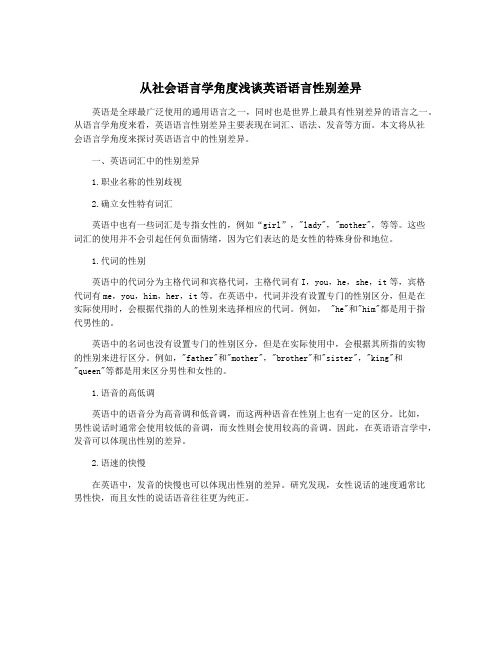
从社会语言学角度浅谈英语语言性别差异英语是全球最广泛使用的通用语言之一,同时也是世界上最具有性别差异的语言之一。
从语言学角度来看,英语语言性别差异主要表现在词汇、语法、发音等方面。
本文将从社会语言学角度来探讨英语语言中的性别差异。
一、英语词汇中的性别差异1.职业名称的性别歧视2.确立女性特有词汇英语中也有一些词汇是专指女性的,例如“girl”,"lady","mother",等等。
这些词汇的使用并不会引起任何负面情绪,因为它们表达的是女性的特殊身份和地位。
1.代词的性别英语中的代词分为主格代词和宾格代词,主格代词有I,you,he,she,it等,宾格代词有me,you,him,her,it等。
在英语中,代词并没有设置专门的性别区分,但是在实际使用时,会根据代指的人的性别来选择相应的代词。
例如, "he"和"him"都是用于指代男性的。
英语中的名词也没有设置专门的性别区分,但是在实际使用中,会根据其所指的实物的性别来进行区分。
例如,"father"和"mother","brother"和"sister","king"和"queen"等都是用来区分男性和女性的。
1.语音的高低调英语中的语音分为高音调和低音调,而这两种语音在性别上也有一定的区分。
比如,男性说话时通常会使用较低的音调,而女性则会使用较高的音调。
因此,在英语语言学中,发音可以体现出性别的差异。
2.语速的快慢在英语中,发音的快慢也可以体现出性别的差异。
研究发现,女性说话的速度通常比男性快,而且女性的说话语音往往更为纯正。
从社会语言学角度浅谈英语语言性别差异
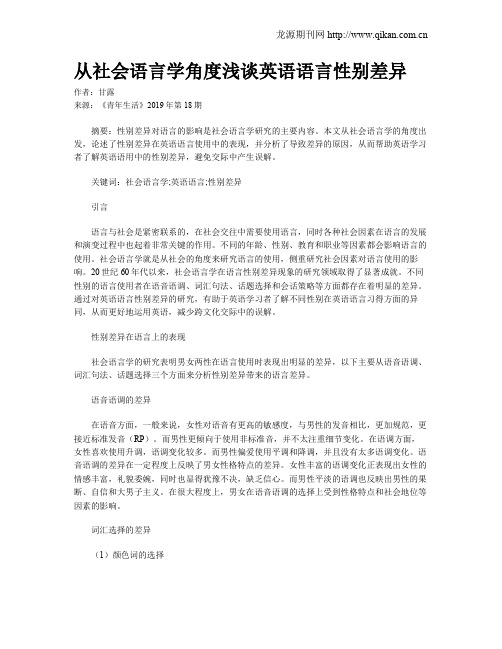
从社会语言学角度浅谈英语语言性别差异作者:甘露来源:《青年生活》2019年第18期摘要:性别差异对语言的影响是社会语言学研究的主要内容。
本文从社会语言学的角度出发,论述了性别差异在英语语言使用中的表现,并分析了导致差异的原因,从而帮助英语学习者了解英语语用中的性别差异,避免交际中产生误解。
关键词:社会语言学;英语语言;性别差异引言语言与社会是紧密联系的,在社会交往中需要使用语言,同时各种社会因素在语言的发展和演变过程中也起着非常关键的作用。
不同的年龄、性别、教育和职业等因素都会影响语言的使用。
社会语言学就是从社会的角度来研究语言的使用,侧重研究社会因素对语言使用的影响。
20世纪60年代以来,社会语言学在语言性别差异现象的研究领域取得了显著成就。
不同性别的语言使用者在语音语调、词汇句法、话题选择和会话策略等方面都存在着明显的差异。
通过对英语语言性别差异的研究,有助于英语学习者了解不同性别在英语语言习得方面的异同,从而更好地运用英语,减少跨文化交际中的误解。
性别差异在语言上的表现社会语言学的研究表明男女两性在语言使用时表现出明显的差异,以下主要从语音语调、词汇句法、话题选择三个方面来分析性别差异带来的语言差异。
语音语调的差异在语音方面,一般来说,女性对语音有更高的敏感度,与男性的发音相比,更加规范,更接近标准发音(RP)。
而男性更倾向于使用非标准音,并不太注重细节变化。
在语调方面,女性喜欢使用升调,语调变化较多。
而男性偏爱使用平调和降调,并且没有太多语调变化。
语音语调的差异在一定程度上反映了男女性格特点的差异。
女性丰富的语调变化正表现出女性的情感丰富,礼貌委婉,同时也显得犹豫不决,缺乏信心。
而男性平淡的语调也反映出男性的果断、自信和大男子主义。
在很大程度上,男女在语音语调的选择上受到性格特点和社会地位等因素的影响。
词汇选择的差异(1)颜色词的选择由于女性对色彩和审美具有天生的认知优势,加上女性更加追求潮流时尚,因此与男性相比,女性对颜色词汇更为敏感。
从社会语言学角度浅谈英语语言性别差异

从社会语言学角度浅谈英语语言性别差异【摘要】本文从社会语言学角度深入探讨了英语语言性别差异的问题。
在介绍了英语语言性别差异的重要性,并引入了社会语言学的概念,阐明研究目的和意义。
在分析了英语语言中存在的性别刻板印象,讨论了语言对性别认知和表达的影响,探究了语言中的性别偏见体现,以及女性和男性在语言运用中的特点。
在总结了语言性别差异的表现形式,探讨了对于性别平等的启示,并展望了未来研究方向。
通过本文的探讨,可以更深入地了解英语语言中的性别差异问题,为促进性别平等和消除性别偏见提供启示和指导。
【关键词】关键词:英语语言性别差异,社会语言学,性别刻板印象,性别认知,性别偏见,性别平等,女性特点,男性特点,研究方向,性别差异表现形式。
1. 引言1.1 介绍英语语言性别差异的重要性英语语言性别差异是一个备受关注的话题,因为语言作为人类社会生活中不可或缺的一部分,承载着文化、认知和社会关系的重要信息。
性别差异在语言中的存在影响着人们对于性别角色和性别认知的构建,反映了社会对于男女在语言运用中的不同态度和定位。
通过研究英语语言中的性别差异,我们可以深入了解社会对于性别的偏见和刻板印象,探讨性别平等的现状和挑战,为促进性别平等和消除性别歧视提供理论和实践支持。
引起对英语语言性别差异的关注是非常必要和重要的。
通过对性别差异在语言中的表现形式进行分析和解读,不仅可以揭示潜在的性别歧视问题,更可以促进社会各界对于性别平等的重视和思考,推动社会朝着更加公平和包容的方向发展。
1.2 引入社会语言学的概念引入社会语言学的概念,是为了更好地理解英语语言性别差异背后的深层次原因。
社会语言学研究的是语言与社会之间的相互关系,探讨语言如何受社会因素影响,以及语言如何反过来影响社会。
在研究语言性别差异时,社会语言学提供了一种更广阔的视角,可以通过考察社会文化、权力结构、传统观念等因素,来解释为什么语言会呈现出性别差异。
社会语言学认为,语言不仅仅是一种交流工具,也是文化和社会关系的体现。
从社会语言学角度谈英语中的语言性别差异
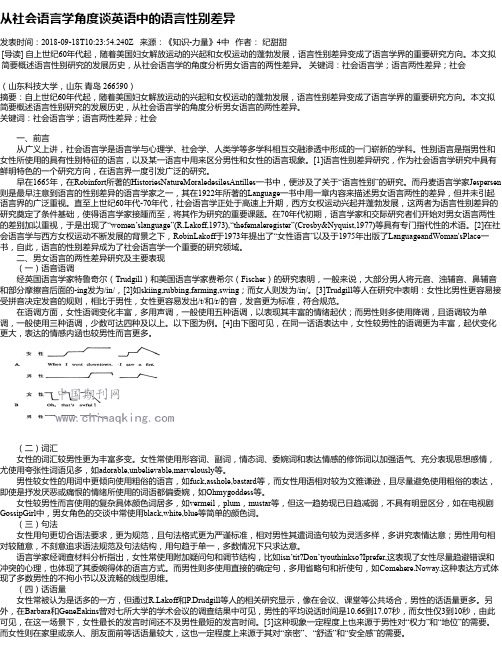
从社会语言学角度谈英语中的语言性别差异发表时间:2018-09-18T10:23:54.240Z 来源:《知识-力量》4中作者:纪甜甜[导读] 自上世纪60年代起,随着美国妇女解放运动的兴起和女权运动的蓬勃发展,语言性别差异变成了语言学界的重要研究方向。
本文拟简要概述语言性别研究的发展历史,从社会语言学的角度分析男女语言的两性差异。
关键词:社会语言学;语言两性差异;社会(山东科技大学,山东青岛 266590)摘要:自上世纪60年代起,随着美国妇女解放运动的兴起和女权运动的蓬勃发展,语言性别差异变成了语言学界的重要研究方向。
本文拟简要概述语言性别研究的发展历史,从社会语言学的角度分析男女语言的两性差异。
关键词:社会语言学;语言两性差异;社会一、前言从广义上讲,社会语言学是语言学与心理学、社会学、人类学等多学科相互交融渗透中形成的一门崭新的学科。
性别语言是指男性和女性所使用的具有性别特征的语言,以及某一语言中用来区分男性和女性的语言现象。
[1]语言性别差异研究,作为社会语言学研究中具有鲜明特色的一个研究方向,在语言界一度引发广泛的研究。
早在1665年,在Robinfort所著的HistoriesNatureMoraledesilesAntilles一书中,便涉及了关于“语言性别”的研究。
而丹麦语言学家Jespersen 则是最早注意到语言的性别差异的语言学家之一,其在1922年所著的Language一书中用一章内容来描述男女语言两性的差异,但并未引起语言界的广泛重视。
直至上世纪60年代-70年代,社会语言学正处于高速上升期,西方女权运动兴起并蓬勃发展,这两者为语言性别差异的研究奠定了条件基础,使得语言学家接踵而至,将其作为研究的重要课题。
在70年代初期,语言学家和交际研究者们开始对男女语言两性的差别加以重视,于是出现了“women’slanguage”(koff,1973),“thefemaleregister”(Crosby&Nyquist,1977)等具有专门指代性的术语。
从社会语言学角度分析英语中性别语言差异的原因
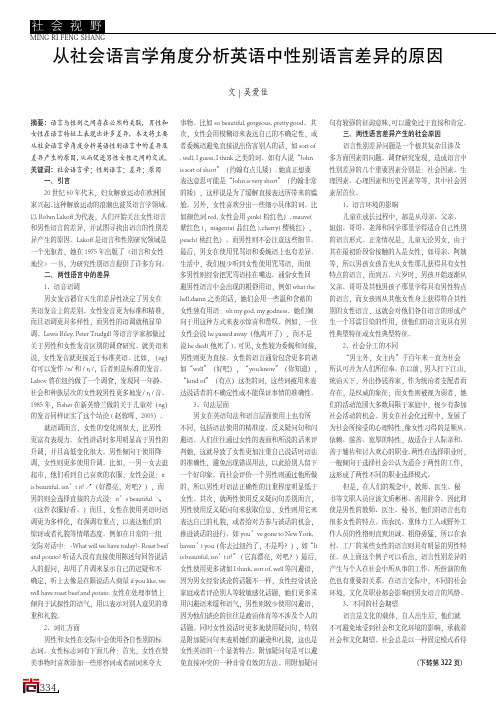
文|吴爱佳从社会语言学角度分析英语中性别语言差异的原因摘要:语言与性别之间存在必然的关联,男性和女性在语言特征上表现出许多差异,本文将主要从社会语言学角度分析英语性别语言中的差异及差异产生的原因,从而促进男性女性之间的交流。
关键词:社会语言学;性别语言;差异;原因一、引言20世纪60年代末,妇女解放运动在欧洲国家兴起。
这种解放运动的浪潮也波及语言学领域。
以Robin Lakoff为代表,人们开始关注女性语言和男性语言的差异,并试图寻找出语言的性别差异产生的原因。
Lakoff是语言和性别研究领域是一个先驱者,她在1975 年出版了《语言和女性地位》一书,为研究性别语言提供了许多方向。
二、两性语言中的差异1、语音语调男女发音器官天生的差异性决定了男女在英语发音上的差别。
女性发音更为标准和精准,而且语调更具多样性,而男性的语调就稍显单调。
Lewis Riley, Peter Trudgill等语言学家都做过关于男性和女性发音区别的调查研究。
就美语来说,女性发音就更接近于标准英语。
比如,(ng)有可以发作/n/和/η/,后者则是标准的发音。
Labov曾在纽约做了一个调查,发现同一年龄、社会和种族层次的女性较男性更多地发/η/音。
1985 年,Fisher在新英格兰做的关于儿童对(ng)的发音同样证实了这个结论(赵蓉晖,2005)。
就语调而言,女性的变化则很大,比男性更富有表现力。
女性讲话时多用明显高于男性的升调,并且高低变化很大。
男性倾向于使用降调,女性则更多使用升调。
比如,一男一女去逛超市,他们看到自己喜欢的衣服,女性会说:it is beautiful, isn’t it? ↗(好漂亮,对吧?),而男的则会选择直接的方式说:it’s beautiful.↘(这件衣服好看。
)而且,女性在使用英语时语调更为多样化,有强调有重点,以表达他们的惊讶或者礼貌等情绪态度。
例如在日常的一组交际对话中:-What will we have today?- Roast beef and potato?听话人没有直接使用陈述句回答说话人的提问,却用了升调来显示自己的迟疑和不确定,听上去像是在跟说话人商量if you like, we will have roast beef and potato.女性在处理事情上倾向于试探性的语气,用以表示对别人意见的尊重和礼貌。
从社会语言学角度浅谈英语语言性别差异

从社会语言学角度浅谈英语语言性别差异
英语是世界上使用最广泛的语言之一,其在不同地区使用的差异也显而易见。
而社会
语言学是研究语言与社会关系的学科,其探讨了语言与社会、文化、身份、权力等方面的
关系。
在社会语言学角度下,英语语言性别差异也是一个有趣的话题。
第二,在英语交际中,语言性别差异也存在。
在一些社交场合中,人们更倾向于使用
不同的语言风格和语言语气,以表示自己的身份和性别。
例如,女性经常使用更委婉和温
柔的用语风格,如“I was wondering if you could…”和“I’m sorry to bother you…”等,而男性更倾向于使用更直接和果断的用语风格,如“I need…”和“I want…”等。
这些语言差异也可能产生性别不平等或者性别歧视。
第三,在英语广告中也存在性别差异。
广告是一种宣传和传播思想、产品、服务等信
息的手段。
然而,在英语广告中,可能存在性别刻板印象的现象。
一些产品和服务仅仅针
对性别而设计,比如化妆品、男式剃须刀、女式内衣等,这种情况表明广告在一定程度上
也存在性别歧视的现象。
总之,在英语中存在着性别差异,包括语言结构、用法、交际和广告等方面。
这些差
异产生的原因复杂多样,包括社会和文化因素的影响。
因此,我们需要在使用英语的时候,对这些差异保持敏感并尽量避免产生性别歧视的言论和行为,以促进男女平等的社会环境。
社会语言学视角下英语语言中性别差异的探讨

语言研究社会语言学视角下英语语言中性别差异的探讨华 芳 王燕娜【摘 要】语言是人类进行交流的重要工具,其对社会实践活动的开展有着极大的影响,社会发展离不开语言交流。
在悠久的社会发展时期,性别语言差异越来越明显,同时也覆盖到了各种语言语种。
鉴于此,本文对语言性别产生差异的主要原因做出了阐述,并且对性别语言差异在英语中的体现做出了深入分析研究。
【关键词】社会语言学 语言 性别差异社会的不断进步,使得社会各界开始关注语言与性别之间的关系。
在英语语言中,性别差异表现的比较明显。
因此,为了帮助人们了解英语语言中的性别差异,培养人们学习英语的技巧,进而提高英语学习的效率,必须站在社会语言学的角度对英语语言中的性别差异进行分析探讨。
一、语言性别产生差异的主要原因(一)生理、心理方面因素男性与女性不仅在身体构造上有差异,在心理方面也有着显著差异。
首先,在生理方。
男性与女性有着不同的发音器官,使得男性与女性在发音音量与音色上有着很大差异。
男性喉头不仅大而且比较突出,声带也比较宽厚,而女性则恰恰相反。
因此,男性说话的音色比较低沉、浑厚。
而女性声音则比较轻而且声调比较高。
此外,男性发音呼出的气流量显著高于女性,声音便显得相对浑厚有力。
其次,在心理方面。
一般情况下,男性语言都偏向坚定、刚毅,女性语言则更倾向于亲切、温婉。
这不仅是人类社会观念中的思维定式,同时也是社会观念对男性、女性所赋予的传统语言模式,人类必须尊重这种语言模式[1]。
女性与男性在初学语言时,所受到的性别语言教育便存在很大差异,进而导致了语言中性别差异现象。
总体来说,男性与女性在生理与心理方面的差异是语言性别差异的基本产生原因。
(二)社会分工的不同在我国悠久的历史长河中,男性与女性的社会分工是不同的。
尽管现代社会更加强调男性与女性的平等。
但是,在特殊的社会角色上,男性与女性社会分工的差异性仍然比较明显。
一直以来,在人们的传统观念中,男性与女性的社会角色是不同的,对社会发展所起到的作用也是不通的。
探析社会语言学视阈下的英语语言性别差异现象
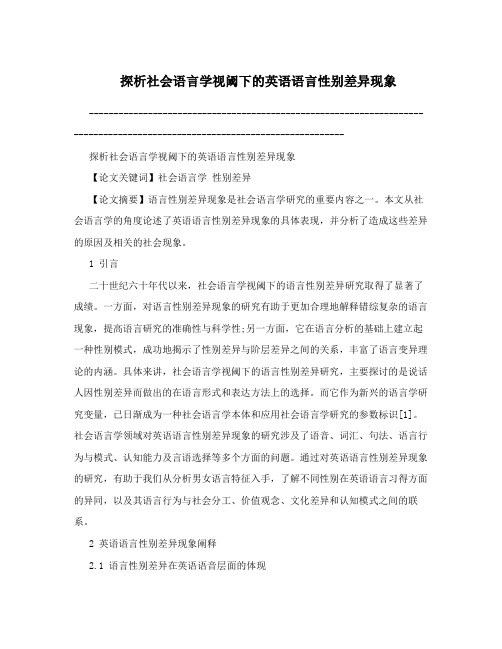
探析社会语言学视阈下的英语语言性别差异现象---------------------------------------------------------------------------------------------------------------------------探析社会语言学视阈下的英语语言性别差异现象【论文关键词】社会语言学性别差异【论文摘要】语言性别差异现象是社会语言学研究的重要内容之一。
本文从社会语言学的角度论述了英语语言性别差异现象的具体表现,并分析了造成这些差异的原因及相关的社会现象。
1 引言二十世纪六十年代以来,社会语言学视阈下的语言性别差异研究取得了显著了成绩。
一方面,对语言性别差异现象的研究有助于更加合理地解释错综复杂的语言现象,提高语言研究的准确性与科学性;另一方面,它在语言分析的基础上建立起一种性别模式,成功地揭示了性别差异与阶层差异之间的关系,丰富了语言变异理论的内涵。
具体来讲,社会语言学视阈下的语言性别差异研究,主要探讨的是说话人因性别差异而做出的在语言形式和表达方法上的选择。
而它作为新兴的语言学研究变量,已日渐成为一种社会语言学本体和应用社会语言学研究的参数标识[1]。
社会语言学领域对英语语言性别差异现象的研究涉及了语音、词汇、句法、语言行为与模式、认知能力及言语选择等多个方面的问题。
通过对英语语言性别差异现象的研究,有助于我们从分析男女语言特征入手,了解不同性别在英语语言习得方面的异同,以及其语言行为与社会分工、价值观念、文化差异和认知模式之间的联系。
2 英语语言性别差异现象阐释2.1 语言性别差异在英语语音层面的体现(1)音质差异明显:从生理学的角度来看,男女的发声器官是有差别的。
男性的声带比女性的长,厚,且松弛,这样的差异必然导致了男女性别在音质上有所差异。
而英语音质所体现出的性别差异,是一种带有社会标记的语言现象。
以鼻音前的原因为例,美式英语中鼻化元音多为男性使用,而口音化元音多为女性使用。
从社会语言学角度谈英语中性别差异
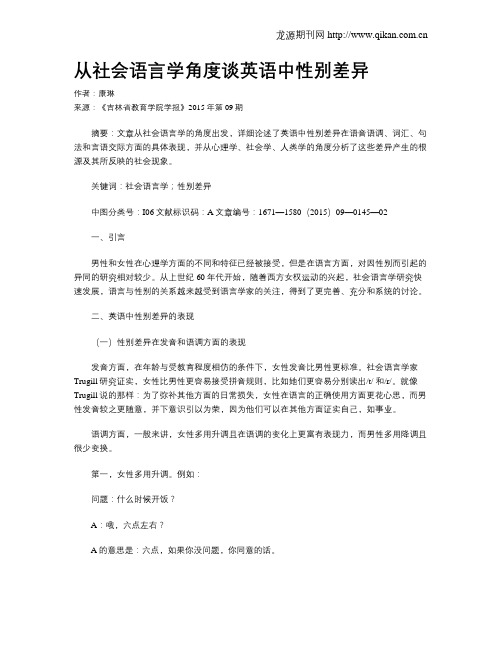
从社会语言学角度谈英语中性别差异作者:康琳来源:《吉林省教育学院学报》2015年第09期摘要:文章从社会语言学的角度出发,详细论述了英语中性别差异在语音语调、词汇、句法和言语交际方面的具体表现,并从心理学、社会学、人类学的角度分析了这些差异产生的根源及其所反映的社会现象。
关键词:社会语言学;性别差异中图分类号:I06文献标识码:A文章编号:1671—1580(2015)09—0145—02一、引言男性和女性在心理学方面的不同和特征已经被接受,但是在语言方面,对因性别而引起的异同的研究相对较少。
从上世纪60年代开始,随着西方女权运动的兴起,社会语言学研究快速发展,语言与性别的关系越来越受到语言学家的关注,得到了更完善、充分和系统的讨论。
二、英语中性别差异的表现(一)性别差异在发音和语调方面的表现发音方面,在年龄与受教育程度相仿的条件下,女性发音比男性更标准。
社会语言学家Trugill研究证实,女性比男性更容易接受拼音规则,比如她们更容易分别读出/t/ 和/r/。
就像Trugill说的那样:为了弥补其他方面的日常损失,女性在语言的正确使用方面更花心思,而男性发音较之更随意,并下意识引以为荣,因为他们可以在其他方面证实自己,如事业。
语调方面,一般来讲,女性多用升调且在语调的变化上更富有表现力,而男性多用降调且很少变换。
第一,女性多用升调。
例如:问题:什么时候开饭?A:哦,六点左右?A的意思是:六点,如果你没问题,你同意的话。
事实上A是唯一知道答案并能给出答案的人,但她仍然用升调,表明女性犹豫不定、考虑他人想法的特点。
第二,女性比男性更多地使用降调来分散压力,这是一个不自信的表现。
例如,在句子“我希望你试试”中,男性把重点放在最后一个词“试试”,而女性会使用最低的语调读最重要的词。
女性这么做只是想暗示:即使这不是小事,我也不想介入,试不试完全取决于你自己。
男性说话时更愿意表现男子气概,所以语调更自信坚定,而女性展现她们的温柔和文雅,所以语调是顺从和不确定的。
英语论文两性语言表现的差异论文
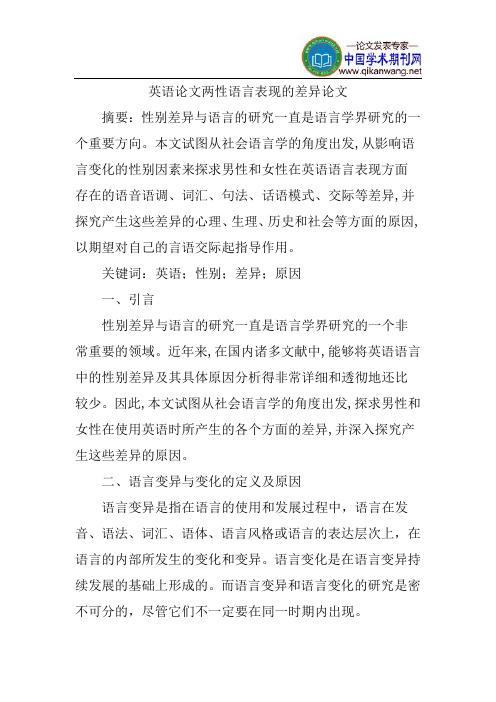
英语论文两性语言表现的差异论文摘要:性别差异与语言的研究一直是语言学界研究的一个重要方向。
本文试图从社会语言学的角度出发,从影响语言变化的性别因素来探求男性和女性在英语语言表现方面存在的语音语调、词汇、句法、话语模式、交际等差异,并探究产生这些差异的心理、生理、历史和社会等方面的原因,以期望对自己的言语交际起指导作用。
关键词:英语;性别;差异;原因一、引言性别差异与语言的研究一直是语言学界研究的一个非常重要的领域。
近年来,在国内诸多文献中,能够将英语语言中的性别差异及其具体原因分析得非常详细和透彻地还比较少。
因此,本文试图从社会语言学的角度出发,探求男性和女性在使用英语时所产生的各个方面的差异,并深入探究产生这些差异的原因。
二、语言变异与变化的定义及原因语言变异是指在语言的使用和发展过程中,语言在发音、语法、词汇、语体、语言风格或语言的表达层次上,在语言的内部所发生的变化和变异。
语言变化是在语言变异持续发展的基础上形成的。
而语言变异和语言变化的研究是密不可分的,尽管它们不一定要在同一时期内出现。
研究产生语言变化的原因,是语言学家们十分关注的对象。
“语言变化是很正常和自然的,并且最终也是不可避免的。
内部因素对语言变化的影响源于所有语言经历的这个自然的过程”(mayer, 2009)也就是说语言变化是所有语言系统都要经历的一个很自然的和普遍的过程,并不是一种特殊的罕见现象。
而引起语言变异的社会因素是多方面的,holmes(1996,张廷国&郝树壮,2008))曾列举了下列社会因素:即参与者(participant)、场景(setting)、话题(topic)、身份(status)、言语功能(function)、性别(sex)、年龄(age)和社会阶层(social class)等。
三、社会因素中的性别因素与语言变化lakoff(1975)以及许多社会语言学家都认为,语言上的性别差异反映出男性与女性在社会中被期望扮演不同的社会角色, 在谈话过程中有不同表现, 并且以不同的方式对待他人。
从社会语言学角度浅谈英语语言性别差异
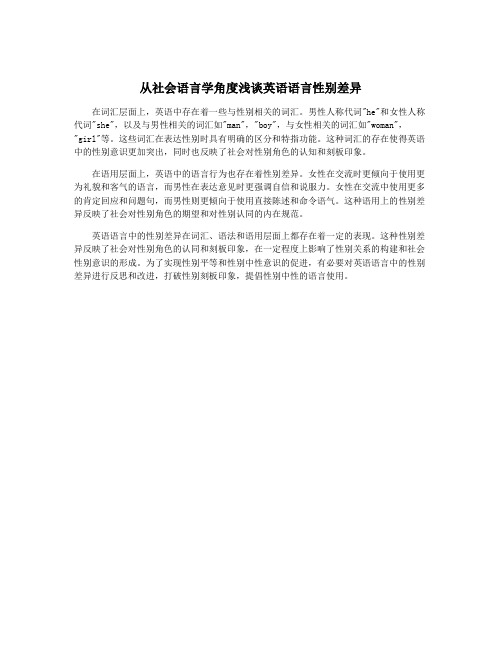
从社会语言学角度浅谈英语语言性别差异
在词汇层面上,英语中存在着一些与性别相关的词汇。
男性人称代词"he"和女性人称代词"she",以及与男性相关的词汇如"man","boy",与女性相关的词汇如"woman","girl"等。
这些词汇在表达性别时具有明确的区分和特指功能。
这种词汇的存在使得英语中的性别意识更加突出,同时也反映了社会对性别角色的认知和刻板印象。
在语用层面上,英语中的语言行为也存在着性别差异。
女性在交流时更倾向于使用更为礼貌和客气的语言,而男性在表达意见时更强调自信和说服力。
女性在交流中使用更多的肯定回应和问题句,而男性则更倾向于使用直接陈述和命令语气。
这种语用上的性别差异反映了社会对性别角色的期望和对性别认同的内在规范。
英语语言中的性别差异在词汇、语法和语用层面上都存在着一定的表现。
这种性别差异反映了社会对性别角色的认同和刻板印象,在一定程度上影响了性别关系的构建和社会性别意识的形成。
为了实现性别平等和性别中性意识的促进,有必要对英语语言中的性别差异进行反思和改进,打破性别刻板印象,提倡性别中性的语言使用。
社会心理语言学与英语言语行为性别差异
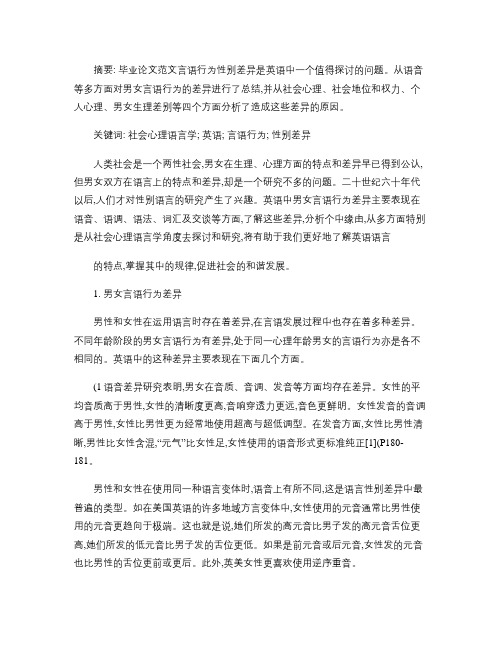
摘要: 毕业论文范文言语行为性别差异是英语中一个值得探讨的问题。
从语音等多方面对男女言语行为的差异进行了总结,并从社会心理、社会地位和权力、个人心理、男女生理差别等四个方面分析了造成这些差异的原因。
关键词: 社会心理语言学; 英语; 言语行为; 性别差异人类社会是一个两性社会,男女在生理、心理方面的特点和差异早已得到公认,但男女双方在语言上的特点和差异,却是一个研究不多的问题。
二十世纪六十年代以后,人们才对性别语言的研究产生了兴趣。
英语中男女言语行为差异主要表现在语音、语调、语法、词汇及交谈等方面,了解这些差异,分析个中缘由,从多方面特别是从社会心理语言学角度去探讨和研究,将有助于我们更好地了解英语语言的特点,掌握其中的规律,促进社会的和谐发展。
1. 男女言语行为差异男性和女性在运用语言时存在着差异,在言语发展过程中也存在着多种差异。
不同年龄阶段的男女言语行为有差异,处于同一心理年龄男女的言语行为亦是各不相同的。
英语中的这种差异主要表现在下面几个方面。
(1语音差异研究表明,男女在音质、音调、发音等方面均存在差异。
女性的平均音质高于男性,女性的清晰度更高,音响穿透力更远,音色更鲜明。
女性发音的音调高于男性,女性比男性更为经常地使用超高与超低调型。
在发音方面,女性比男性清晰,男性比女性含混,“元气”比女性足,女性使用的语音形式更标准纯正[1](P180-181。
男性和女性在使用同一种语言变体时,语音上有所不同,这是语言性别差异中最普遍的类型。
如在美国英语的许多地域方言变体中,女性使用的元音通常比男性使用的元音更趋向于极端。
这也就是说,她们所发的高元音比男子发的高元音舌位更高,她们所发的低元音比男子发的舌位更低。
如果是前元音或后元音,女性发的元音也比男性的舌位更前或更后。
此外,英美女性更喜欢使用逆序重音。
(2语调差异一般来讲,女性说话时多用升调,语调变化多而富有表现力,而男性讲话时多用降调,语调变化少。
社会语言学视角下的英语语言性别差异
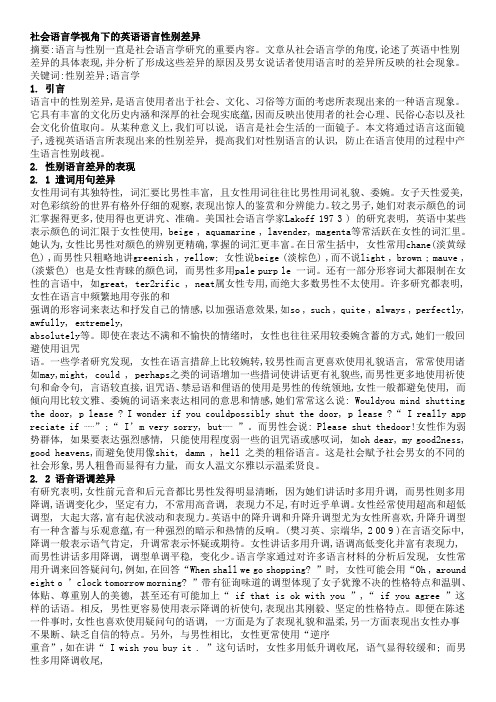
社会语言学视角下的英语语言性别差异摘要:语言与性别一直是社会语言学研究的重要内容。
文章从社会语言学的角度,论述了英语中性别差异的具体表现,并分析了形成这些差异的原因及男女说话者使用语言时的差异所反映的社会现象。
关键词:性别差异;语言学1. 引言语言中的性别差异,是语言使用者出于社会、文化、习俗等方面的考虑所表现出来的一种语言现象。
它具有丰富的文化历史内涵和深厚的社会现实底蕴,因而反映出使用者的社会心理、民俗心态以及社会文化价值取向。
从某种意义上,我们可以说, 语言是社会生活的一面镜子。
本文将通过语言这面镜子,透视英语语言所表现出来的性别差异, 提高我们对性别语言的认识, 防止在语言使用的过程中产生语言性别歧视。
2. 性别语言差异的表现2. 1 遣词用句差异女性用词有其独特性, 词汇要比男性丰富, 且女性用词往往比男性用词礼貌、委婉。
女子天性爱美, 对色彩缤纷的世界有格外仔细的观察,表现出惊人的鉴赏和分辨能力。
较之男子,她们对表示颜色的词汇掌握得更多,使用得也更讲究、准确。
美国社会语言学家Lakoff 197 3 ) 的研究表明, 英语中某些表示颜色的词汇限于女性使用, beige , aquamarine , lavender, magenta等常活跃在女性的词汇里。
她认为,女性比男性对颜色的辨别更精确,掌握的词汇更丰富。
在日常生括中, 女性常用chane(淡黄绿色) ,而男性只粗略地讲greenish , yellow; 女性说beige (淡棕色) ,而不说light , brown ; mauve , (淡紫色) 也是女性青睐的颜色词, 而男性多用pale purp le 一词。
还有一部分形容词大都限制在女性的言语中, 如great, ter2rific , neat属女性专用,而绝大多数男性不太使用。
许多研究都表明,女性在语言中频繁地用夸张的和强调的形容词来表达和抒发自己的情感,以加强语意效果,如so , such , quite , always , perfectly, awfully, extremely,absolutely等。
英语语言中的男女性别差异研究,英语语言学论文
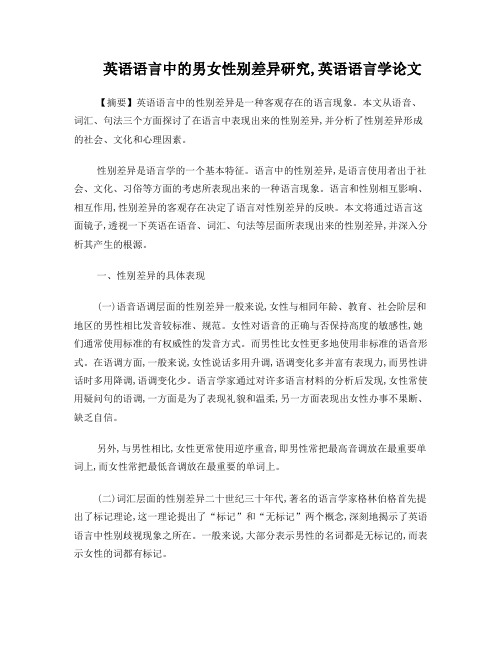
英语语言中的男女性别差异研究,英语语言学论文【摘要】英语语言中的性别差异是一种客观存在的语言现象。
本文从语音、词汇、句法三个方面探讨了在语言中表现出来的性别差异,并分析了性别差异形成的社会、文化和心理因素。
性别差异是语言学的一个基本特征。
语言中的性别差异,是语言使用者出于社会、文化、习俗等方面的考虑所表现出来的一种语言现象。
语言和性别相互影响、相互作用,性别差异的客观存在决定了语言对性别差异的反映。
本文将通过语言这面镜子,透视一下英语在语音、词汇、句法等层面所表现出来的性别差异,并深入分析其产生的根源。
一、性别差异的具体表现(一)语音语调层面的性别差异一般来说,女性与相同年龄、教育、社会阶层和地区的男性相比发音较标准、规范。
女性对语音的正确与否保持高度的敏感性,她们通常使用标准的有权威性的发音方式。
而男性比女性更多地使用非标准的语音形式。
在语调方面,一般来说,女性说话多用升调,语调变化多并富有表现力,而男性讲话时多用降调,语调变化少。
语言学家通过对许多语言材料的分析后发现,女性常使用疑问句的语调,一方面是为了表现礼貌和温柔,另一方面表现出女性办事不果断、缺乏自信。
另外,与男性相比,女性更常使用逆序重音,即男性常把最高音调放在最重要单词上,而女性常把最低音调放在最重要的单词上。
(二)词汇层面的性别差异二十世纪三十年代,著名的语言学家格林伯格首先提出了标记理论,这一理论提出了“标记”和“无标记”两个概念,深刻地揭示了英语语言中性别歧视现象之所在。
一般来说,大部分表示男性的名词都是无标记的,而表示女性的词都有标记。
如: prince, actor, waiter, host, heir 等无标记,但如果把它们变成表示女性的名词就得加上相应的后缀-ess 等,如 prin-cess, actress,waitress, hostess, heiress。
这种后缀说明了相反的意思。
也就是说,男性名词是常用的、普通的,而女性名词是在男性名词基础上加后缀构成的。
- 1、下载文档前请自行甄别文档内容的完整性,平台不提供额外的编辑、内容补充、找答案等附加服务。
- 2、"仅部分预览"的文档,不可在线预览部分如存在完整性等问题,可反馈申请退款(可完整预览的文档不适用该条件!)。
- 3、如文档侵犯您的权益,请联系客服反馈,我们会尽快为您处理(人工客服工作时间:9:00-18:30)。
Gender Differences in the English Language from A Perspective ofSociolinguistics2012812059杨光AbstractLanguage is a symbol system closely related to human life. Gender language, as a social variant of language, with its characteristics and differences, has attracted increasing attention from a great many linguists at home and abroad. The characteristics and differences of the language use between male and female are distinctive. Men and women are the subjects of social activities, language is an important tool of human social activities. The socialization of gender roles leads to the differences of gender in using language. The gender differences in English language have distinctive linguistic characteristics and actual presentations in terms of pronunciations, intonation, vocabulary and syntax from the perspective of sociolinguistics. Through a descriptive and comparative analysis of the language differences between males and females, we tries to find out the causes of formation of gender differences in English language from the perspective of social and cultural background, social position, biology and psychology. The characteristics and differences of the language use between male and female are obvious. The gender differences in English have distinctive linguistic characteristics and actual presentations in terms of pronunciation, intonation, vocabulary, syntax and communication from the perspective of sociolinguistics. These differences are closely related to the cultural and historical background, social roles and physiological and psychological features of the females.Key words:sociolinguistics; gender differences; male; female;Since the 1960s, the gender differences in sociolinguistics has made remarkable achievements. On the one hand, the study of the phenomenon of language gender differences contribute to a more reasonable explanation of the intricacies of the language phenomenon and to improve the accuracy of the research. On the other hand, it establishes a gender patterns based on the analysis of the language to successfully reveal the relationship between gender differences and class differences and enrich the connotation of the theory of language variation. Specifically it studies choices of language forms and expression by the speaker for the sake of gender differences. As an emerging linguistic variety, it has a parameter identification of applied sociolinguistic[1].The differences of voice and intonation: From a physiological point of view, the vocal organs of men and women are different. The vocal cords of males are longer and thicker than that of females which lead to gender difference in voice quality. The gender differences of English voice quality is a linguistic phenomenon with social marker from a cultural perspective. The nasalization has a rough, vulgar implication that is not appropriate for females because the females’ behaviors should be graceful. Pitch refers to the frequency of the sound when the vocal cords vibrate. The vocal cords of men are long and thick, the pronunciation of average pitch is lower than the females. Generally speaking, the man's voice frequency is about 100-150 Hz, while the woman’s voice frequency is between 200-325 Hz. The females speak in rising tone which are full of fluctuations and expressiveness, while males are in low tone which have not much changes. The most favorite tones of females are fall-rise and rise-fall that have a subtle and optimistic implication, because there is a strong hint and enthusiastic response. The females often answer questions in rising tone,eg: “When shall we go shopping?”, they always say with consultation: “Oh, around eight o’clock tomorrow morning?” which shows that hesitation, gender ,co nsiderable personality and the virtue of respecting others, sometimes they probably add “if that is ok with you”, “if you agree”. On the contrary males will show fortitude, firm characters using a falling tone. Comparing with males , females take fluent, standardized and authoritative pronunciation seriously, thinking that the pronunciation is an important symbol of their upbringings, whereas males don’t pay attention to the subtle aspects and they are proud of making use of non-standardized forms of pronunciation. Males like to express the subordinate form of –in or the form of –i instead of the form of –ing, so women have more gifts than males.The gender differences presented in vocabulary: (1)women are good at usingcolor words. There is a basic vocabulary of color such as black, white, red, yellow, blue, green, gray, brown, orange and so on. Different colors will bring different feelings such as cold and warm feelings, the sense of distance and weight and excitement, so various colors have different symbolic meaning in language, females have a stronger acquisition than males. In 1981, Nowaczyk made a test for Y ork University students focusing on color matching and color description. During a test of matching 20 colors, the female students are able to accurately write 71% of the color names, male students write 46%. 63% of female students are able to describe differences of colors, only 40% of male students can communicate this task. In addition, the results also showed that female students use more complex color terms than males’.(2) From an aesthetic point of view, women have a stronger recognition of color than men because they feel the external form of beauty more deeply than men. Therefore women have an innate cognitive advantages making them possess richer vocabulary , perception ,classification and mental characters of colors than males.(3)A research of sociolinguistics shows that women like to use words to make their own words with emotional meaning such as tone, interjection and exaggerated words as a means of expression of emotion in speech activities. They tend to use the words of showing praise and intimacy in the process of communication. In actual communication they make use of these words to make communication smooth such as so good, such fun, exquisite, lvoely, divine, precious, adorable, charming, fantastic, sweet, darling, baby, babe which are regarded as socially lubricant to expose female emotional performance. The prototype of males is calm, confident .If they use these words ,they should be sissy. Females use more adjectives and adverbs than males to strengthen language power such as so, much, quite, very very, so so, awfully, pretty, terribly, vastly, quite, whereas males tend to use these words such as very, really ,utterly. Males always use the curse, profane, insulting and obscene words and interjection to express their feelings such as shit, damn, piss, cunt, fuck, because their personalities are bold, forthright, strong and ambitious. In the aspect of interjection they will choose Lord, Good lord, Good heavens, Bless my soul, while females choose Oh dear, Goodness, Gracious, Dear me, birdie,bookie,hankie,dearie,sweetie. The following example is cited by Lakoff , we can clearly see the differences of interjection used by men and women:O h dear, you’ve put the peanut butter in the refrigerator again.Shit, you’ve put the peanut butter in the refrigerator again.Females like to use exaggerated sense of the word such as gorgeous, lovely, cute,divine, adorable, darling, precious, sweet, charming. eg: Y our dress is too adorable. / He’s a wonderful friend. However males tend to use plain words to strengthen effectiveness such as good, very, really ,utterly. Jesperson found that females would more widely use the word “so” than males to strengthe n the mood and express attitude, eg: It was so interesting.(4)Females will more widely use polite words than males such as please, thanks. They tend to use some euphemism or indirect words to express what they feel inconvenient or undesirable or embarrassed. eg: I have to go powder my nose instead of I need to use the toilet. Would you mind shutting the door, please?I wonder if you could possibly shut the door, please? “I really appreciate if……”;“I’m very sorry, but……”. As a kind of informal term, slang is often considered as men’s territory, eg: With one’s pants down. Males are willing to say : “you caught me with my pants down”, it won’t be appropriate for women to say that.Oscar Wilde said: "women are charming, they may never want to say anything, it was enough to make ecstasy swing soul if they said.” The long-standing ritual practices show that women should be gentle, demure and prudent, so women must always pay attention to their demeanor and use graceful and standardized languages , otherwise they will lack self-cultivation. Therefore, in this social atmosphere women should speak in a soft, gentle sound. W omen mental age are earlier than males’ before puberty which makes their understanding of interpersonal relationships and psychology deeper than males. After puberty, males are brave to risk, women are gentle and delicate. These different psychological characteristics determine that there are obvious differences in language style.(1) males’ words are more succinct and direct. An American sociolinguist had ever said that the discourse of women are politer than females’ words because the expressions of women are less confident than males’, women always like to express their views adding "You know", "I think", "I guess" or "I'm not sure" “It seems to me”“Well”, “you know”, “kind of” "Do you think so?” and "Would you please ...? ". The study finds that even if women feel confident about what they say, they are still not confident or hesitant. Women like to use modal words to suggest others instead of ordering others to do something such as could, may, might, should, would. And then they like to use some adverbs of modal meaning to avoid assertion such as maybe, perhaps, probably, possibly, certainly. If they entrust others, women often take an indirect tactful way to say: “I was wondering if you could possibly do me a small favor, if you wouldn’t mind.” But men like bluntly to express their wishes and ideas instead of hesitating. The study also shows that there are some gender differences in the use of the imperative. Women willuse complex sentences or questions whereas men use simple sentences without modifications. The situation in the Lebanon is awful, isn't it?”“They caught the robber last week, didn't they?”Michael:Grime the pliers (Poochie gives pliers to Michael).Huey: Get off my steps (Poochie moves down steps) (Coats,1986:107).If we want others to turn down radio volume, men generally like to use "Please turn down your radio." Women will say "Would you please turn down your radio?" or "Will you please turn down your radio? "[2]. Women also like to use the sentence pattern of Let’s, eg:Sharon: Let’s go around subs and subs.In general, men often talk about some topics such as work, economy, sports and competition, the topics of women are social life, family, personal affairs and emotional feelings. Comparing with men, women are more willing to talk about the topic directly and candidly reveal their emotions, men seldom reveal themselves in front of others. The reason is that women seek to establish intimate friendship by talking about the topic of personal feelings, Men expect to show prestige and dominance through some serious topics.Gender differences in word-formation: Modern society is“phallocentric”and “logocentirc”, Derrida points that in a patriarchal society, the word center is very obvious, women are implicit halfly. An American linguists mentioned a typical example in the book of Sexism and Language,Let me show you the restrictions that would be placed on my daughter...Among the peculiar restrictions placed on her would be that could never really participate in the brotherhood of mankind. And regardless of what her forefathers were, she couldn’t have been born an Irishman, a Frenchman ,or a Dutchman...At school she would have to learn early that she could serve on committees but never be the spokesman or chairman. She could participate in sports, but she could not practice sportsmanship. In baseball she could be a pitcher or a catcher but not the ball boy or the first baseman...even if she rose to real power in the world and became a queen, she couldn’t rule because there are only kingdoms-no queendoms...But if by some happenstance, she did succeed in gaining power in government, the real tragedy is that she could never be a statesman-only a politician.In the passage we can understand that the whole human race belongs to mankind, the country is a kingdom of mankind, statesman is mankind as well as chairman, policeman, businessman, and salesman, kinsman, countryman, Dutchman, Frenchman. Some words of animals are used to describe the characteristics of humanbehaviors, but this evolution is embodied with gender discrimination, eg: chicken( a young girl who has no experience). <Sexismand Language> mentioned that: In her youth, she is a chicken, then she marries and feeling cooped up, so she goes to hen parties where she cackles with her friend.Then she has her brood and begins to henpeck her husband. Finally she turns into an old biddy.Gender differences in proverbs: English proverb has a long history that records the experience and wisdom of working people in different times. They have some implications of machismo, indicating that women are inferior to men such as1)A man is as old as he feels and a woman as old as she looks.2) The beauty of a man is in his intelligence;and the intelligence of the woman is in her beauty.3) Frailty, thine name is woman.4) The only secret a woman can keep is that of her age.5)There are three ways of spreading news-telegraph, telephone, and tell-a-woman.6) Modesty is the ornament of woman.7) The more women look in their glass, the less they look to their house.8) A woman, a dog and a walnut tree, the more you beat them, the better they will be.9) A man of straw is worth of a woman of gold.Modes of discourse and strategy: Women are willing to cooperate with each other in the conversation, everyone has a chance and turn to speak. At the beginning of the conversation, women tend to explicitly mention the topic which has been said and try to make their own words associate with it and keep the conversation coherent and smooth. Therefore, they always focus on a topic to talk about for a long time, the switch of the topic is relatively slow. Women pay more attention to the listener’s reactions which are reflected in the speech. When someone is talking, the women will response actively and use a a number of words and sentences to express they are listening. They rarely interrupt others and will say something to apologize if they do. Men often exhibit stronger competitiveness in the conversation and seize a chance to control the topics. At the beginning of their conversation men simply say what they want to express, the switch of the topic is abrupt which never has coherence. When others say, they react slowly and seldom agree with others. They often interrupt others but never show their sense of apology. The men who are interrupted are to protest while the women who are interrupted keep silent. So there are many disputes amongmen. In addition women like to make use of polite words, the theory of “face” directly points out that the degree of politeness is determined by mutual benefits of people, eg: “Would you mind closing the window?” is politer than “Please close the window”. In Britain people always satisfy the demands of face especially women.English is an exhibition of gender differences like other languages. The simplest and most obvious difference is the personal pronoun, man is “he” and woman is “she” which are hated by feminists. When the object of gender described is unknown, we often use "he” to represent“he” and “she”, “men” to represent “men” and “women” in the traditional writing rules. But the study shows that when people read or hear "man" or "he", they usually assume to write or say a male, the vast majority of the tested all say that the mind is an image of male not the combination of image of male and female.(Jennifer Griffith)The underlying causes of the gender difference in the English language: Sociolinguistics defines that a social phenomenon, language reflects society all the time. There are some differences in social division of labor of men and women, so men are regarded as the master of the family and social center holding dominance in the social system. On the contrary women are in the weak, dependent and subordinate position. Gender differences in the language faithfully reflect the social reality. On the other hand , as a carrier of culture language is not only an important part of social consciousness but also the specific manifestations of the culture. In most traditional cultures, people expect women to be gentle, kind and perceptual and men to be strong, calm and decisive. There are different requirements for speaking style and speech acts of men and women in the society based on this starting point. Some linguists believe that men and women grow up in different socio-linguistic context of subcultures, they must learn their own behaviors and communicative ways that are adapt to gender, this cultural background is an important factor of gender differences in the language.(1)physiological factors: The innate physiological differences of men and women determine language use of “men and women are different”. According to the latest medical research, the left hemisphere of the brain of a woman is much earlier than that of a man that determines women speak standard, fluent and emotional language. In addition the lung capacity of women are less than that of men so the sounds of women are soft and weak while while the male is rugged and powerful.(2) cultural and psychological factors: In any country and cultural beliefs, people have different expectations of gender roles and behavior thus female languages are cordial, courteous, kind while male languages are rough, arrogant, firm. This inherentsocial expectations become a powerful social pressure forcing people to regulate their own behaviors in accordance with their respective gender patterns.(3) social factors: Language is a special kind of social phenomenon which is created from labor and has close relationship with activities of production. In the traditional concept of western, woman is just a rib of man ,she is subordinate to man. The men represent power, status, domination, etc, the social roles of women are decoration and embellishment. The traditional thinking seriously hinders the female perspective and has direct impact on the political and economic status of women. In this environment, female languages are identified as non-standard or strong so women lack self-confidence and like to rely on others when speaking. With the development of a society, some women go out to work and gain higher positions in certain sectors. There is no gap of personal ability between men and women. Social advancement and enhancement of the ability make women become more and more confident. The gender differences in the English language gradually narrow but there are still arduous tasks and a long road to achieve equality. The gender differences in the English language are rooted in the lower social status of women and dependence on men.The society is an universe, men and women in it are materials , language is the role of various substances. In short, gender differences in the English language are closely linked with social factors, cultural factors and psychological factors. To some degrees it probes into the needs of the political, economic, cultural style and these factors restrict language use. The correct recognition and understanding of gender differences have significances for parole communication. It can guide the different gender students to learn to use authentic English to express their ideas for their own gender roles and understand language while enhancing the students' awareness of the culture of the target language.References[1]Fasold,Ralph.The sociolinguistics of language [M]. Cambridge:Blackwell,1999[2] Lakoff, Robin To lmach. Language and women’ s place [J] . Language inSociety,1973(4).[3] 戴炜栋.言语性别差异综述[J].外国语,1983(6):1-5[4]Hirschman,L. 1973. Female-male Differences in Conversational Interaction,[J]Paper[5] 徐祥武.性别差异在英语中的体现[J].外国语,1986(5):33-36[6] Coats. Women, Men and Language[M]. Longman Inc, New Y ork: LongmanInc,1986.[7] Loveday, l.Pitch, politeness and sexual role: an exploratory investigation intothe pitch correlates of English and Japanese politeness formulae. Language and Speech, 1981(24):71-87。
